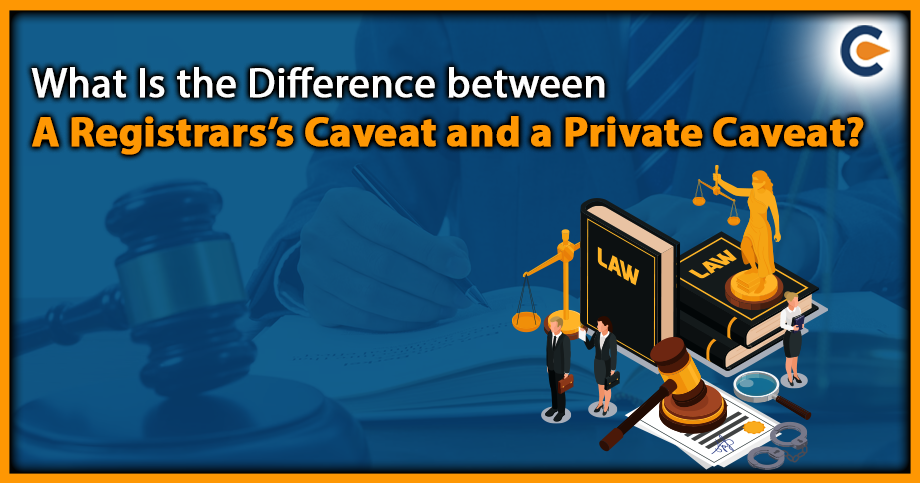In India, a caveat is a legal notice filed by a party that informs the court not to take any action in a particular case without giving the party an opportunity to be heard. The caveat serves as a form of protection for the party against any adverse order or judgement that may be passed in the case without their knowledge.
There are two types of caveats that can be filed in India: a Registrar’s Caveat and a Private Caveat. In this blog, we will discuss the difference between the two.
- Registrar’s Caveat:
A Registrar’s Caveat is a notice filed by the Registrar of a court. This type of caveat is filed when there is a likelihood that a case may be filed in the court. The purpose of a Registrar’s Caveat is to ensure that the party filing the caveat is given notice of any application or petition that may be filed in the court by another party.
- Private Caveat:
A Private Caveat is a notice filed by a private party, typically a litigant or a lawyer, in a particular case. The purpose of a Private Caveat is to prevent the court from passing any adverse order or judgment in the case without giving notice to the party who has filed the caveat. This type of caveat is typically filed in cases where the party fears that the other side may try to obtain an ex-parte order or judgment without their knowledge.
Now that we have discussed the two types of caveats, let us look at,
The Differences between a Registrar’s Caveat and a Private Caveat
- Filing Authority:
A Registrar’s Caveat can only be filed by the Registrar of a court, while a Private Caveat can be filed by a private party, typically a litigant or a lawyer.
Purpose:
A Registrar’s Caveat is filed to ensure that the party filing the caveat is given notice of any application or petition that may be filed in the court by another party. A Private Caveat is filed to prevent the court from passing any adverse order or judgment[1] in the case without giving notice to the party who has filed the caveat.
Time Period:
A Registrar’s Caveat is valid for a period of 90 days from the date of filing, while a Private Caveat is valid until the disposal of the case.
Scope:
A Registrar’s Caveat applies to all applications or petitions that may be filed in the court, while a Private Caveat applies only to the particular case in which it is filed.
Caveats are commonly used in India in civil matters, such as property disputes, probate matters, and commercial litigation. When a caveat is filed in a case, the court is required to give notice of any application or petition filed in the case to the party who has filed the caveat. This ensures that the party has an opportunity to be heard before any decision is taken in the case.
As mentioned earlier, there are two types of caveats that can be filed in India: a Registrar’s Caveat and a Private Caveat. A Registrar’s Caveat is filed by the Registrar of a court when there is a likelihood that a case may be filed in the court. The purpose of a Registrar’s Caveat is to ensure that the party filing the caveat is given notice of any application or petition that may be filed in the court by another party. A Registrar’s Caveat is valid for a period of 90 days from the date of filing.
A Private Caveat, on the other hand, is filed by a private party, typically a litigant or a lawyer, in a particular case. The purpose of a Private Caveat is to prevent the court from passing any adverse order or judgment in the case without giving notice to the party who has filed the caveat. A Private Caveat is valid until the disposal of the case.
It is important to note that a caveat is not a substitute for appearing in court or filing a proper legal proceeding. Rather, it is a protective measure that can be taken by a party to ensure that they are not caught off guard by any adverse order or judgment in a case. It is always advisable to consult with a lawyer before filing a caveat or taking any other legal action in a case.
Conclusion
Caveats are a common feature of the Indian legal system and are filed in civil matters such as property disputes, probate matters, and commercial litigation. The purpose of a caveat is to protect a party from any adverse order or judgment that may be passed in a case without their knowledge. It is important to note that a caveat is not a substitute for appearing in court or filing a proper legal proceeding. It is merely a protective measure that can be taken by a party to ensure that they are not caught off guard by any adverse order or judgment in a case.
When a caveat is filed in a case, the court is required to give notice of any application or petition filed in the case to the party who filed the caveat. This ensures that the party has an opportunity to be heard before any decision is made in the case. It is always advisable to consult with a lawyer before filing a caveat or taking any other legal action in a case. This will help ensure that the party’s rights are protected and that they are taking the appropriate legal steps to achieve their desired outcome.
Read Our Article: How To File A Caveat Petition In India?











